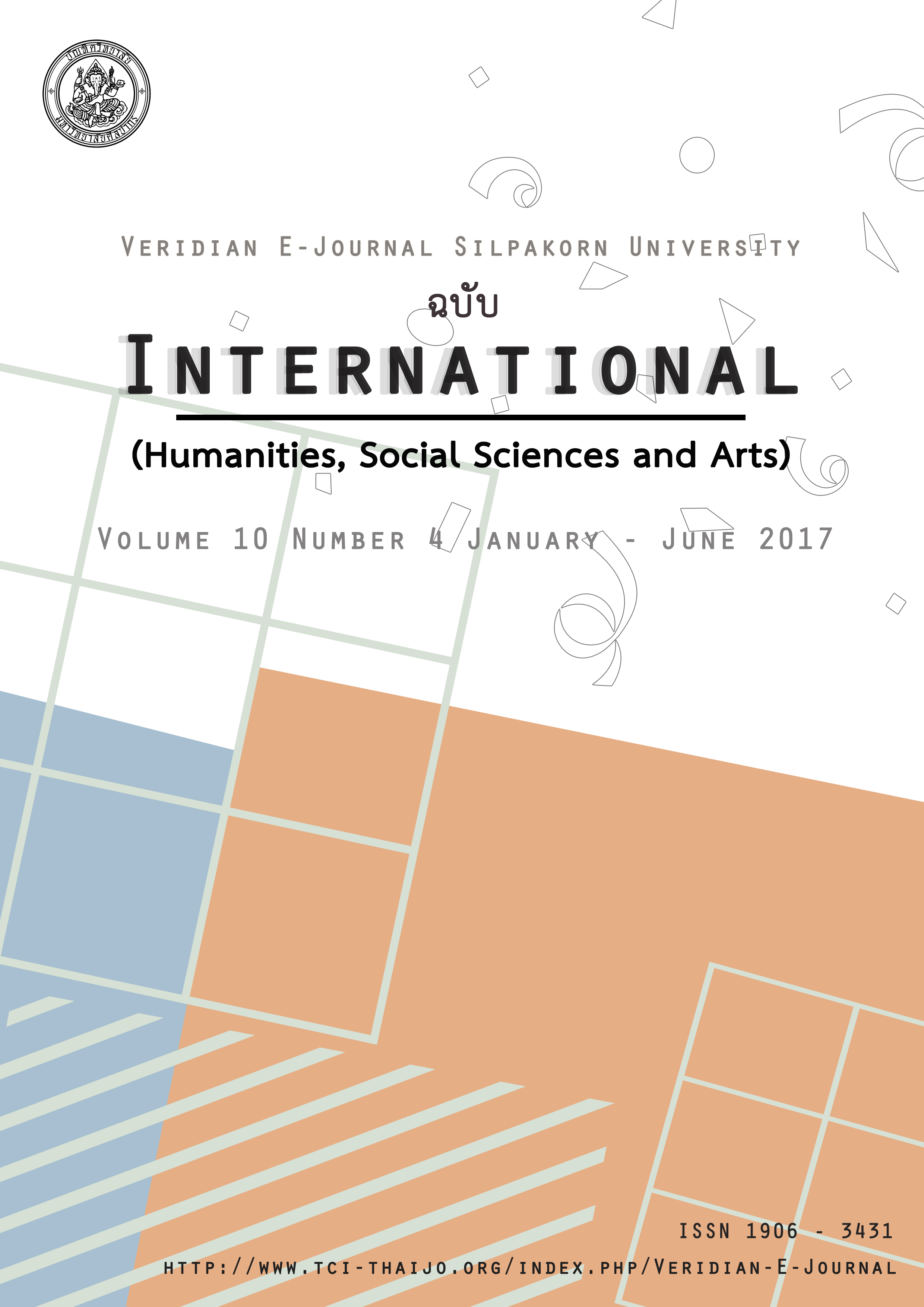The Evaluation of the Ph.D Curriculum in Educational Administration (revised 2556 B.E.)
Main Article Content
บทคัดย่อ
The purposes of this study were to 1) evaluate the Ph.D curriculum in Educational administration (revised 2556 B.E.) at Silpakorn University and 2) examine the development and management guidelines for Ph.D curriculum in Educational administration. The research was conducted using Stufflebeam’s CIPP Model to evaluate the curriculum, following a mixed methods; in which the data was collected through documentary study, structured interview and questionnaire, which had a response rate of 92.23%. Teachers, Doctoral advisory committee, Ph.D graduates and their superiors, with the total of 12 persons, were interviewed; and the questionnaires were used to collect the data from 133 Ph.D students during the academic year of 2556-2559 B.E. The data was analyzed by frequency, percentage, mean, standard deviation, and content analysis.
The findings were as follow:
1. The evaluation of Ph.D curriculum in Educational administration, from the qualitative and quantitative data collected from the interviews and the questionnaire, was found appropriate and satisfying in all aspects: context, input, process, and output.
2. The development and management guidelines for Ph.D curriculum in Educational administration were that the Department of Educational Administration 1) should monitor and focus on the changes in the education context in the country; 2) should strengthen its role in being an educational leader; 3) should adjust the curriculum contents to be more up to date and help build awareness in the role of Ph.D graudates; 4) should improve learning resources and other facilities such as computers, printers, internet system, online database, etc.; 5) encourage teachers, staff and students to engage more in curriculum management; 6) develop practicum activities and others activities to help students carry on with their research; 7) increase communication channels to provide formal and informal academic advising for Ph.D students; 8) develop students’ characteristics, academic leadership and self-discipline; 9) support teachers’ and staff’s development; and 10) encourage instructors/ teachers to conduct research, write academic articles, and publicize the work in the international arena.
การวิจัยประเมินหลักสูตรครั้งนี้มีวัตถุประสงค์ 1) เพื่อประเมินหลักสูตรปรัชญาดุษฎีบัณฑิต สาขา วิชาการบริหารการศึกษา (หลักสูตรฉบับปรับปรุง พ.ศ. 2556) มหาวิทยาลัยศิลปากร และ 2) เพื่อศึกษาแนวทาง การพัฒนาและบริหารหลักสูตรปรัชญาดุษฎีบัณฑิต สาขาวิชาการบริหารการศึกษา การวิจัยประเมินหลักสูตร ครั้งนี้อาศัยรูปแบบการประเมิน CIPP ในการประเมินหลักสูตรทั้งระบบและเป็นการศึกษาด้วยระเบียบวิธีวิจัย แบบผสม (mixed methods) ผ่านกระบวนการศึกษาเอกสาร การสัมภาษณ์แบบมีโครงสร้างและแบบสอบ ถามความคิดเห็น ซึ่งได้รับแบบสอบถามกลับคืนมา 92.23% เก็บข้อมูลเกี่ยวกับหลักสูตรจากอาจารย์ประจำหลักสูตร อาจารยภาควิชาอื่น อาจารย์พิเศษ กรรมการผู้ทรงคุณวุฒิภายนอก ดุษฎีบัณฑิตและผู้ใช้ดุษฎีบัณฑิต จำนวน 12 คน และเก็บข้อมูลด้วยแบบสอบถามจากนักศึกษาในปีการศึกษา 2556 - 2559 จำนวน 133 คน และทำการวิเคราะห์ข้อมูลด้วยความถี่ ร้อยละ ค่าเฉลี่ย ค่าส่วนเบี่ยงเบนมาตรฐานและการวิเคราะห์เนื้อหาผลการประเมินครั้งนี้พบว่า
1. การประเมินหลักสูตรปรัชญาดุษฎีบัณฑิต สาขาวิชาการบริหารการศึกษา (หลักสูตรฉบับปรับ ปรุง พ.ศ. 2556) ซึ่งรวบรวมข้อมูล ความคิดเห็นเกี่ยวกับหลักสูตรที่รวบรวมได้ทั้งเชิงคุณภาพและเชิงปริมาณ พบว่า หลักสูตรปรัชญาดุษฎีบัณฑิต สาขาวิชาการบริหารการศึกษา (หลักสูตรฉบับปรับปรุง พ.ศ. 2556) มี ความเหมาะสมและน่าพอใจทั้ง 4 ด้านคือ ด้านบริบท ด้านปัจจัยนำเข้า ด้านกระบวนการและด้านผลลัพธ์
2. แนวทางการพัฒนาและบริหารหลักสูตรปรัชญาดุษฎีบัณฑิต สาขาวิชาการบริหารการศึกษา พบว่า 1) ภาควิชาฯควรติดตามสถานการณ์ความเปลี่ยนแปลงทางการศึกษาของประเทศ 2) ภาควิชาฯ ควรเพิ่มบทบาทการเป็นผู้นำทางการศึกษา 3) ปรับเนื้อหารายวิชาให้ทันสมัย เพิ่มเนื้อหาที่สร้างความตระหนัก ให้แก่นักศึกษาในบทบาทการเป็นดุษฎีบัณฑิต 4) ปรับปรุงแหล่งค้นคว้า ระบบการสืบค้นข้อมูลและสิ่งอำนวย ความสะดวก เช่น คอมพิวเตอร์ ปริ้นเตอร์ จุดเชื่อมต่ออินเตอร์เนทและฐานข้อมูลออนไลน์ เป็นต้น 5) ส่งเสริม การมีส่วนร่วมในการบริหารจัดการหลักสูตรของอาจารย์ บุคลากรและนักศึกษา 6) ปรับกิจกรรมฝึกปฏิบัติงานและจัดกิจกรรมที่ช่วยพัฒนานักศึกษาในการทำวิจัย 7) เพิ่มช่องทางการและปรับระบบการให้คำปรึกษาทางวิชาการแก่นักศึกษา 8) พัฒนาให้นักศึกษามีบุคลิกภาพ ความเป็นผู้นำทางวิชาการและมีระเบียบวินัย 9) จัดระบบการพัฒนาอาจารย์และบุคลากรและ 10) ส่งเสริมให้อาจารย์ทำวิจัยและผลิตผลงานวิชาการและเผย แพร่ผลงานในระดับนานาชาติ

